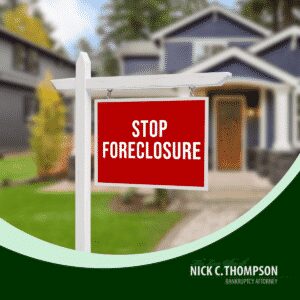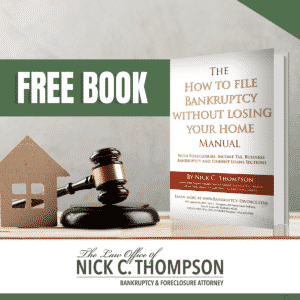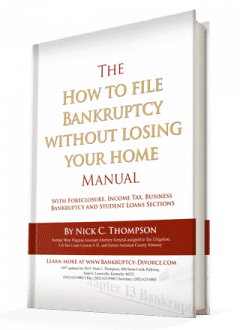Kentucky and most of the states require foreclosure by judicial process. Foreclosures usually occur due to the non-payment of the mortgage payments. However, the failure to pay the property taxes or insurance also causes a property to go into foreclosure.
Interestingly, for criminal activity, the state of Kentucky issues a tax on the real estate if drugs are found on the property. Homes also go into foreclosure for both unpaid property and income taxes by the state and the IRS.
What is a Foreclosure? • Louisville, Kentucky Bankruptcy
These are all causes of foreclosure. The foreclosure process involves serving anyone with an interest in the property. The property can be sold within 90 days in Kentucky, or it may take years depending on an attorney’s ability to defend the foreclosure and other factors.
The mortgage borrower loses his or her home if he fails to defend the foreclosure or pay off the debt. That happens whether it is the mortgage, property taxes, or a person with a lien on the property. Once the sale occurs, the homeowner no longer owns the home. The US 6th Circuit Court rules that there is nothing that reverses the transfer after the property sells at auction. However, there is a right of redemption, but few people can write a check to pay cash for a home after it sells.
Most mortgage companies recover both from the sale of the home and mortgage insurance.
⎆ How foreclosures work.
Chapter 13 offers a method to catch up on those payments. Additionally, Chapter 7 or Chapter 13 gives a homeowner time to sell a home or obtain a mortgage modification. The reasons someone didn’t pay may include disability, death in the family, loss of a job, or divorce. But, whatever the reason, the mortgage goes into default. Then, if the home falls more than two payments behind, the lender eventually files a foreclosure case. Please note that Kentucky uses a judicial foreclosure process.
In some other states, foreclosures happen very quickly. For the Deed in Trust states, an attorney holds the deed to the property until the mortgage payments are made in full. However, if the homeowner defaults, the attorney merely sends the title to the bank, who then owns the property. A Deed in Trust Foreclosure often happens within weeks with little notice to the homeowner.
Often what we find is clients have other debts they are paying, which causes the mortgage to become unaffordable. Due to wage garnishment or high credit card or medical costs, the mortgage payments are not made. Then, the family becomes at risk of homelessness. In Chapter 7, unsecured debts are eliminated so that the mortgage is then paid. Even if you have to file a Chapter 13 later, you can better afford the payments.
Often you have to make choices, and having a home should be more important than a new car or cell phone. Yet some people become homeless to maintain unnecessary expenses. For instance, some medical treatments are essential. But, having a home is more critical than paying credit cards.
⎆ Kentucky foreclosures are simple.
Most foreclosures file after 120 days of non-payment. In fact, after a mortgage falls 60 days or more behind, most lenders refuse to take payments. If you do not pay the property taxes, the taxes may be purchased, and a foreclosure complaint is then filed in court. The lender or purchaser of the property taxes not only recovers the principle but also recovers the attorney fees, court costs, and interest.
It is vital to catch up on the mortgage quickly because as costs increase, it eats up any equity in the property. Unfortunately, it also eats it up about $350 per hour for attorney fees. These costs decrease the likelihood of catching up if you take too long to file Chapter 13.
Filing an answer or bankruptcy is often essential to give a person time to find another home, sell a home, short sale property, modify the mortgage, or pursue other options. The longer you wait to plan how the foreclosure proceeds, the fewer options you have, and the more expensive it is.
⎆ Avoiding the foreclosure early.
There are programs that the lender might initiate before the filing to avoid foreclosure. You might consider selling the property, including a possible short sale. At any point, you can sell the home. But, if you try to have a foreclosure sale within one month, it is unlikely that the house sells in time. So, it easy to see that the quicker you apply the solution, the less you have to pay to the bank either to catch up on the home or to pay off the total. Early solutions might also include a mortgage modification or workout.
Some people also delay the sale as long as possible. This might be your strategy but, if it is, you might want to file a Chapter 7 Bankruptcy to make sure you do not have to repay a deficiency or income tax debt. Also, look into obtaining a HUD-approved counselor who might help you avoid foreclosure. However, there are specific steps the mortgage company and servicer must go through before they file the foreclosure.
 ⎆ The complaint and answer.
⎆ The complaint and answer.
Typically, when the debt is about 180 days overdue, a foreclosure complaint is filed. Then, a defendant only has 20 days to file an answer. The failure to file a response is essentially the same as agreeing to the sale. Certain defenses must be asserted now, or you lose them.
You can ask for additional time to file the answer to a complaint, but ignoring the complaint is fatal and often results in the home being sold within 90 to 180 days. There are about 120 different defenses you can make in your answer, most of which will not be applicable. However, if your attorney spends time with you and asks you about your case, some of them will be discovered. These defenses might help to delay while you look at other options. Or they might even cure the foreclosure.
⎆ What the bank offers.
Often people call the bank or the bank’s attorney. At that time, they learn the options the bank wants them to choose. These options often include the following:
- Pay us off now.
- Sign over the house to us and pay more later.
- Pay us, including all the attorney fees and court costs.
- Pay us up to date, including fees and attorney costs.
The bank rarely advises you to seek a quality attorney and file an answer. Additionally, I never see the bank’s attorney advise you to sue the bank back. Instead, the only choices they give to homeowners are options that create more profit for the bank and their attorney.
In fact, many of the mortgage modifications they offer are at higher mortgage rates or require you to turn over significant parts or all of your equity in the home. The one thing the bank and their attorney never offer or suggest is to file bankruptcy. That’s because doing so catches up the mortgage or avoids owing them a deficiency.
⎆ Mediation.
After the case is filed, attorneys often demand mediation. This usually allows a face-to-face meeting with the mortgage company in one last effort to avoid litigation. Most foreclosures in state court eventually end up in a sale or bankruptcy. The mediation often allows a workout, so the arrearage adds to the end of the loan. This is not a permanent fix if the problem that causes the foreclosure is only temporary. Please note that if the homeowner has only excuses for the problem or wants to blame the bank, the mediation is very short. But, in arbitration, the homeowner often only has to show the problem is temporary and therefore cured.
⎆ Discovery.
Discovery is a set of questions, requests for documentation, and admissions, requested from the other side. The answers are admissible in court as evidence. But, it might take months for the bank to complete these responses. Also, each side can request this of the opposing party. Often after the facts have been set forth, there are no issues of fact, and there are only issues of law, one side or both sides ask for summary judgments.
⎆ Summary judgment.
Summary judgment is granted if there are no facts in the case to argue over. It actually replaces a trial on the facts when no events are contested. Also, summary judgment motions often file after discovery or answer files. Often homeowners submit their answers and admit to the default without suing the bank back. Failing to include essential defenses speeds up the summary judgment and sale.
Once a summary judgment is granted, it usually is too late to negotiate a settlement or mediate any issues. Then, the case proceeds immediately to the Commissioner. At that time, the Commissioner will advertise it for two weeks and then sell the property in an auction. However, Bankruptcy can file before the sale to stop the sale. But, be aware that filing one minute after the purchase or the same minute of the sale will not save the home.
⎆ Bankruptcy 7 or 13
It usually takes days or weeks to meet with a client and adequately plan the strategy for a bankruptcy. In a quality case, there are documents to provide, classes to take, and hours to prepare the petition.
If you appear in the office hours before the sale, you can’t take the time to plan the bankruptcy properly. If you appear after someone purchases your property and they own the property, nothing can be done. Chapter 7 typically delays the sale for about six months. After that, you are generally back to another sale date. However, you can take up to five years to catch up on the mortgage in Chapter 13.
⎆ Sale and problems with deficiency or taxable income.
The vital benefit of bankruptcy is that it leaves no deficiency or 1099 income tax problems. Most mortgage companies do not sue to collect a deficiency judgment, but some do. All mortgage companies report any deficiency as earned income on a 1099C for income tax purposes. In fact, filing bankruptcy cures both problems by ending your liability for the debt. There is also no deficiency if the property sells after the bankruptcy. There is also no tax liability.
A bankruptcy only requires you to wait two years before you can qualify for an FHA, VA, or HUD loan. If the property sells in foreclosure, it is three to seven years before you are eligible for an FHA, VA, or HUD mortgage. In fact, a foreclosure has a much worse effect on your credit than bankruptcy. Additionally, foreclosures make you wait more than three times longer for loans than bankruptcy.
 Resources for Bankruptcy
Resources for Bankruptcy
Louisville Kentucky Bankruptcy Forms
Stop your Mortgage Foreclosure in Louisville Kentucky • Video
Learn About Louisville Short Sales
How to Effectively Stop Foreclosure in 2020
Kentucky Foreclosure Law Process
How Kentucky Foreclosure Works
If you are thinking about filing bankruptcy, don’t delay because timing is crucial. I am here to help you. So, contact my office right away to start the conversation. Nick C. Thompson, Bankruptcy Lawyer: 502-625-0905.
 ⎆ The complaint and answer.
⎆ The complaint and answer.
